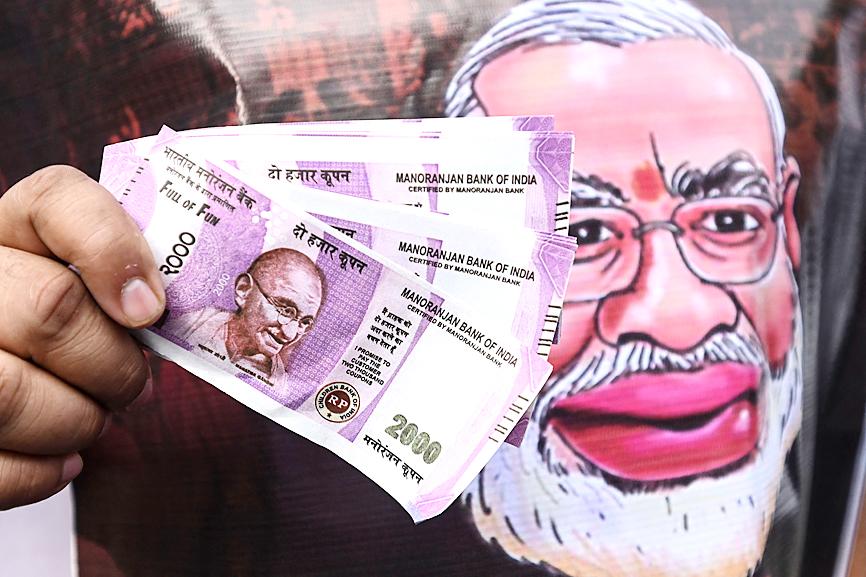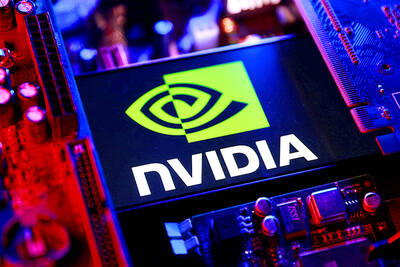India is planning progressive and forward-looking measures on issues related to cryptocurrencies, a move that could be a departure from its earlier attempts to restrict the use of virtual coins, people familiar with the matter have said.
Indian Prime Minister Narendra Modi led a review meeting on the digital currency on Saturday, and it was decided that the government would continue to proactively engage with experts and other stakeholders on the evolving technology, the people said, asking not to be identified.
A spokesperson at the prime minister’s office declined to comment.

Photo: AFP
There have been calls in India to impose stricter rules for transactions in virtual coins as an unregulated environment might push more domestic savings toward the asset class and could endanger household savings.
India has had a hot-and-cold relationship with digital currencies in the past few years. In 2018, it effectively banned cryptotransactions after a string of frauds following Modi’s sudden decision to eliminate 80 percent of the nation’s currencies, but the Indian Supreme Court struck down the restriction in March last year.
The Reserve Bank of India remains a critic, but is now working on a digital currency. The government might bring in a cryptobill for the Cabinet’s approval.
The meeting also concluded that attempts to mislead the country’s younger generation through over-promising and non-transparent advertisements should be stopped, the people said.
It was also discussed that unregulated cryptomarkets cannot be allowed to become avenues for money laundering and terror financing, they said.
The meeting also considered global examples and best practices, the people said.
It was highlighted that India should seek global partnerships and collective strategies on the issue, they said.
India’s parliamentary panel on finance is scheduled to meet industry experts and associations on challenges and opportunities in cryptofinance today.

POWERING UP: PSUs for AI servers made up about 50% of Delta’s total server PSU revenue during the first three quarters of last year, the company said Power supply and electronic components maker Delta Electronics Inc (台達電) reported record-high revenue of NT$161.61 billion (US$5.11 billion) for last quarter and said it remains positive about this quarter. Last quarter’s figure was up 7.6 percent from the previous quarter and 41.51 percent higher than a year earlier, and largely in line with Yuanta Securities Investment Consulting Co’s (元大投顧) forecast of NT$160 billion. Delta’s annual revenue last year rose 31.76 percent year-on-year to NT$554.89 billion, also a record high for the company. Its strong performance reflected continued demand for high-performance power solutions and advanced liquid-cooling products used in artificial intelligence (AI) data centers,

SIZE MATTERS: TSMC started phasing out 8-inch wafer production last year, while Samsung is more aggressively retiring 8-inch capacity, TrendForce said Chipmakers are expected to raise prices of 8-inch wafers by up to 20 percent this year on concern over supply constraints as major contract chipmakers Taiwan Semiconductor Manufacturing Co (TSMC, 台積電) and Samsung Electronics Co gradually retire less advanced wafer capacity, TrendForce Corp (集邦科技) said yesterday. It is the first significant across-the-board price hike since a global semiconductor correction in 2023, the Taipei-based market researcher said in a report. Global 8-inch wafer capacity slid 0.3 percent year-on-year last year, although 8-inch wafer prices still hovered at relatively stable levels throughout the year, TrendForce said. The downward trend is expected to continue this year,

‘BASICALLY A BAN’: Sources said the wording governing H200 imports from officials was severe, but added that the regulations might change if the situation evolves Chinese customs authorities told customs agents this week that Nvidia Corp’s H200 artificial intelligence (AI) chips are not permitted to enter China, three people briefed on the matter said. Chinese government officials also summoned domestic technology companies to meetings on Tuesday, at which they were explicitly instructed not to purchase the chips unless necessary, two of the people and a third source said. “The wording from the officials is so severe that it is basically a ban for now, though this might change in the future should things evolve,” one of the people said. The H200, Nvidia’s second-most powerful AI chip, is one

A proposed billionaires’ tax in California has ignited a political uproar in Silicon Valley, with tech titans threatening to leave the state while California Governor Gavin Newsom of the Democratic Party maneuvers to defeat a levy that he fears would lead to an exodus of wealth. A technology mecca, California has more billionaires than any other US state — a few hundred, by some estimates. About half its personal income tax revenue, a financial backbone in the nearly US$350 billion budget, comes from the top 1 percent of earners. A large healthcare union is attempting to place a proposal before